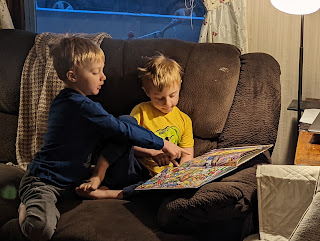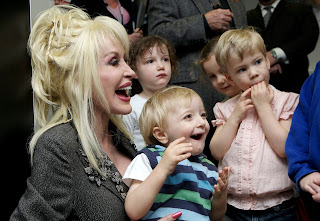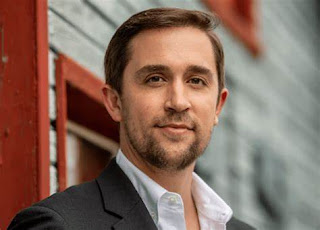It’s because I’ve grown weary of our obsession with crafting straw men in order to blame someone besides ourselves for the slow death of public education. Sure Rufo, and his ilk contribute in a significant manner to the ongoing dismantling of the public system, but if we really want to hold culprits accountable we need just look in the mirror.
Saturday, July 16, 2022
It's Coming From Inside The House
It’s because I’ve grown weary of our obsession with crafting straw men in order to blame someone besides ourselves for the slow death of public education. Sure Rufo, and his ilk contribute in a significant manner to the ongoing dismantling of the public system, but if we really want to hold culprits accountable we need just look in the mirror.
Friday, July 15, 2022
Goodbye, Dolly (Note: She's Okay, Honest)
The program launched in 1995 in Sevier County, and it grew quickly. By 2006, when the Washington Post wrote about it, the program had spread to 471 communities in 41 states. In 2011 it launched in Scotland, and it can now be found in the UK, Australia, and Canada. The site says that 706,468 US kids are currently signed up. It's still fairly simple. Some combination of sponsors (some private, some government, depending on the locale) help with the financing (the cost is roughly $27 per child per year) and the Foundation delivers the books, each in its own poly bag with the child's name on it (consider the power of a child, even a small one, receiving a book that is theirs, addressed to them, by name).
 |
| The board of directors examines a position paper |
Wednesday, July 13, 2022
Christopher Rufo and the End of Public Education
Conservatism consists of exactly one proposition, to wit: There must be in-groups whom the law protects but does not bind, alongside out-groups whom the law binds but does not protect.
Put An Insta-Bunker In Your Classroom!
I want to be very clear. This is not The Onion.
A company named National Safety Shelters ("Keeping People Safe") is marketing something it calls in-classroom safety shelters. Here's an image from its website.
The ultimate in hardening your classroom--a solid bubble in which to hide your students. There are videos. like this one entitled "National Safety Shelters' Ultimate Solution To School Security" which starts with the Tinkly Piano Of Concern and statistics about school shootings and tornados (tornado protection appears to be a big part of the selling point here).
If you just want a quick tour of one of these, there's a video for that, too (accompanied by the Folksy Guitar Of Calmness). It's a big metal box that can be custom sized for your room. (Also, you can watch this stunt where they put one in a school that was being demolished.)
In this video, we also learn that they're made of 3/16" ballistic steel. Note that this video is from 2018, but it only had 27 views. Back in 2018 the Big Box collapsed against the wall; I'm not seeing any such feature in the newer iteration.
The company has managed to score at least one school district client, and they are milking it hard. The district is Quitman School District in Quitman, Arkansas, a city of a little over 5,000.
The district has 746 students, PK-12.
The pitch is not just "keep the students safe," but also "increase revenue for your district."
Dennis Truxler, Superintendent at the Quitman School District, credits the security the safety pods provide ― and the peace of mind that comes with knowing they are there ― as part of the reason for the district's 20% increase in student enrollment. Most of the new students have matriculated in from neighboring districts. Significantly, revenue from the increase in student enrollment has more than covered the cost of purchasing and installing the safety pods.The shelters, they insist, only take up unused wall space and only 5% of the room area which is, of course, in many schools about 5% more space than a teacher has to spare. Or maybe in some districts the insta-bunkers can be installed to cover up holes in the wall and leaks in the ceiling; I'm sure "We can't afford to fix up your building, but we can buy some big metal boxes to puit in it" will be a winning message. Some of the material points proudly to the unit that Quitman installed in their cafeteria which the principal thinks would probably hold all their elementary students. Did I mention that total enrollment in the district is 746? I'm trying to imagine what my old crowded band room would look like with a box installed big enough to hold 150 students.
In this video, made the year after Quitman installed their insta-bunkers, you see the shelters in various rooms, and you can see they're already starting to take on their ultimate form-- very sturdy storage. There's room to stash stuff on top, you can decorate the outside. And as nature abhors a vacuum, a classroom abhors empty space that could be used to store that giant stack of textbooks or those bins full of manipulatives. If the insta-bunkers don't fill up with various classroom stuff, I will eat a military grade hat. (And I do not even want to contemplate the creative uses students will come up with.)
Keeping The Classroom Safe
Every teacher has stories.
In my first year, two students were already sitting front to try and improved their focus, but one day they got on each other's last nerves. They came up out of their desks to square off, and before I even thought about it, I stepped forward so that I was between these two very large seniors. My only though at that moment was, "Oh shit. I've made a huge mistake." I got through the moment only because a third student got up and restrained one of the two combatants and I could safely turn my attention to the other.
Decades later, I still had classes in which one or two volatile students could singlehandedly threaten the safe function of the class. These were students I could talk to one-on-one and build a decent rapport, but teenagers are not always masters of their own situations or their responses to them.
I taught for decades in a small rural-ish school, and the volatility in the building varied from year to year (we knew, for instance, that we were in for a rough ride the year that teachers had to break up a fist fight at freshman orientation--between two mothers of incoming students).
Violence in school comes from a variety of sources, often coming as the result of other pressures and problems that spill over into the classrooms or halls of the school. It virtually never occurs because of some "bad kids," but that doesn't mean you can best secure the safety of the learning environment for the other students by just shaking your head and saying, "Well, he's not really a bad kid."
After a year or more of anecdotal accounts spreading here and there, the research is starting to come in on school violence over the past year, and it confirms what almost everyone seemed to be saying for months--this was a bad year for student fights and physical attacks in schools.
The headline for the Chalkbeat piece (Pandemic effect: More fights and class disruptions, new data show) suggests that the pandemic is to blame, and certainly there are plenty of teachers who talked this year about students who had forgotten how to do school, how to coexist peacefully with other students.
There are plenty of other places to point as well. It's hard to imagine that watching parents turn up on line and on the news for screaming at school boards or declaring that teachers are evil, indoctrinating groomers would not trickle down for an erosion of respect among students.
Some folks will continue to point at "squishy" programs like school versions of restorative justice, some of which are undoubtedly terribly implemented. When students know that there will be no real consequences for their actions, that does not help maintain a safe school environment for everyone else.
School discipline (like school most everything) requires a tricky balance-- and a different tricky balance for each student. An authoritarian regime in which administrators insist on browbeating and crushing students is disastrous. A fuzzy administrative approach that involves nothing more than a friendly chat in the office is ineffective. Students who are "acting out" in dangerous and hurtful ways are still human beings, and their actions are probably indicative of issues that are weighing on them. At the same time, the other students need to know that their classroom, their school, is a safe place to be. Neither crushing spirits into compliance nor refusing to demand certain social behaviors from students works for the school as a whole.
Part of the solution is staffing. When a student needs to be out of your class, he has to go somewhere. Sitting in an office with a secretary isn't terribly effective. I'm not going to argue in favor of hiring a school resource officer to handle every bit of student misbehavior as if it were a police matter, either.
There's a piece of old teacher wisdom about classroom management that says you should focus on what you want the students to do rather than what you don't want them to do. Don't say "stop that," but say "start this." I'd argue that a similar idea writ large works for a school; don't focus on what kind of behaviors and students you want to stamp out, but focus instead on what culture and behavior you want to promote.
This has to be teamed up with a culture that treats students like human beings. Positive reinforcement is fine, but getting a silly trinket doesn't motivate you in a professional development session, and it won't motivate your students, either. Nobody wants to be a problem; nobody (okay, almost nobody) sets out to be that bad guy. Sometimes folks need some help getting there--but "help getting there" doesn't mean "free pass for stomping all over people on the way."
There may be one other factor that connects the violence uptick with the pandemic. The pandemic robbed many institutions of their inertia and places where compliance had become a habit--well, that habit was lost.
And what that may mean is that, as with other aspects of school, folks have a chance to build a new set of habits from scratch. Schools have a chance to approach discipline more mindfully, with more deliberate thinking about what kind of culture they'd like to build (hint--a culture of forced compliance is not your best choice). I'm not super-hopeful that schools struggling to get righted will take full advantage of that opportunity, but we should at least wave at it as it floats by.
I have another story from my first year.
I was teaching--handing back papers, actually--when a student from an earlier class came into my room and began to threaten me. Like, standing a few inches away and threatening to grab me by the tie and throw me across the room. I kept doing what I was doing because I didn't know anything else to do. The students in the class just sat there (later they said, "Half of us thought you were petrified and half of us thought you are some kind of martial artist and you didn't want to kill him").
And then he left. And I got through the rest of the day in which I had no breaks left, no chance to contact the office (1980, so pretty low tech). And then, after the last class dismissed and school was out, he came back, and sat down, and we talked for like an hour. He was angry and frustrated over something. He had a history of ragey stuff (I looked up his record and found it included throwing a desk at the teacher in 4th grade).
"Why me," I asked one of my colleagues later. "I thought we had a pretty good working relationship."
"Well, that's it," my colleague replied. "He trusts you." And he took his suspension for the incident without complaint and we finished the year just fine. I often wonder what became of him, even as I wonder about the many ways the whole thing could have gone sideways. If he had not had a place to rage, would he have become violent? Brought in a gun? How did my students in that class process the event? Could I have handled the whole thing better? Could the school system have handled that kid better? I can tell you one thing I did for all of us--I never left my door unlocked again, not for thirty-some years.
How does a school, or a teacher, handle these things, keep an even keel when the seas are wracked by violence. How do you measure out a response to a "student fight" when it can be anything from a silly goof ("Let's make a fight video!") to an inchoate eruption of existential rage and fear and hurt? What do you even calculate. The following year, the year after I left, a middle school student brought a weapon to school and held her English class hostage. What do you even do with that.
I really only have two principles that ever guided me through the issue:
1) Students are actual human beings and deserve to be treated as such.
2) Students deserve to not have their own educations continually interrupted by other peoples' disruptive behavior, nor should they spend time in school being worried about their own physical or psychological safety.
School violence is one of those education issues that defies any sort of easy answer. Consequently, I don't trust anyone who says "This Thing is the cause" or "This Thing is the answer." I don't trust anyone who has a clear, concise, neat bow with which to wrap up the whole issue. We can't sort it out effectively for adults; why would we expect to do any better for young humans
Sunday, July 10, 2022
ICYMI: Matinee Edition (7/10)
Saturday, July 9, 2022
Does Teaching Have A Millennial Problem?
The folks born between 1980-ish and 1996-ish are now in their twenties and thirties, meaning that the young end of the teaching force is occupied by Millennials.
We never talk about that specific issue in education, even as we gnash our teeth over the teacher hiring crisis, and yet the interwebs are jam packed with people in the corporate world writing think pieces about how to hang on to Millennials and manage Millennials and keep Millennials happy so they don't quit, and some of the items brought up in those articles ring a bell.
Many articles challenge the standard wisdom that Millennials are lazy, saying instead that Millennials want to have an actual life outside of work. That's not very compatible with teaching, which comes complete with hours and hours of work outside school hours--and that's before we even start talking about extras like extracurriculars or union involvement. And keep in mind that Millennials are at prime family-starting age, which creates more pressure to get home after work.
Millennials are said to value doing important work (though I'm not entirely convinced that's strictly a Millennial thing). Teaching seems perfectly aligned with that, until you consider the last twenty years of micromanaged test prep. If you showed up in schools in the last decade, you may have walked in the door thinking "And now I am going to change young lives and build a better world" only to be handed a packet of materials you'll be required to use to coach kids toward getting more kids to answer more multipole choice questions with the preferred response.
The big rap on Millennials is that they are disloyal job hoppers. This is brilliantly addressed by this Oatmeal-style cartoon at The Woke Salaryman. Millennials, it explains, expect their loyalty to be earned. Instead employers do things like:
Depressing salaries, finding all sorts of ways to justify paying lower salaries. Ditto benefits.
When employers do talk about salary increase, they talk in terms of what percentage raise the employer wants, instead of talking about what they're worth.
Meaning that Millennials can only get real raises by job hopping.
Then there's this: "If you can't pay us well, at least treat us well." A caring boss, a decent work culture--these things matter to Millennials in ways beyond what, say, us old "suck it up and do the job" boomers settled for.
Businesses used to earn loyalty by rewarding people with pay and pensions for sticking around to climb to the top. Now businesses promote from outside (how many principals in your building are former teachers from in your building). And of course pensions are toast. My pension is actually a damn good one; my wife will see nothing like it when she retires.
The piece makes one other solid point--the people who stay under lousy conditions aren't loyal. They're just trapped. Which doesn't make for great employees.
Any of this seem familiar?
Years ago I happened to meet up with a former student in North Carolina. We joined her, her husband and several other couples around the table. Almost all of them were former teachers who had left the profession early because they could see there were better ways to have the quality of life they wanted to have.
I don't know that there's a special Millennial approach to recruiting and retaining teachers. But I do believe that those of us from earlier generations were more willing power through features like, say, being treated like a flunky or a child instead of a full-grown professional.
If Millennials really are different in the workplace than the generations that came before, maybe that needs to be factored into recruiting and retention efforts. Maybe it's possible that some of the features that have made teaching unattractive are particularly off-putting for Millennials. Would it be useful to treat "how do we keep 50 year old vets from leaving" and "how do we recruit and retain twenty-somethings" as two different questions. I don't know if that's an answer, but I do know that surprisingly few people are considering the question.





